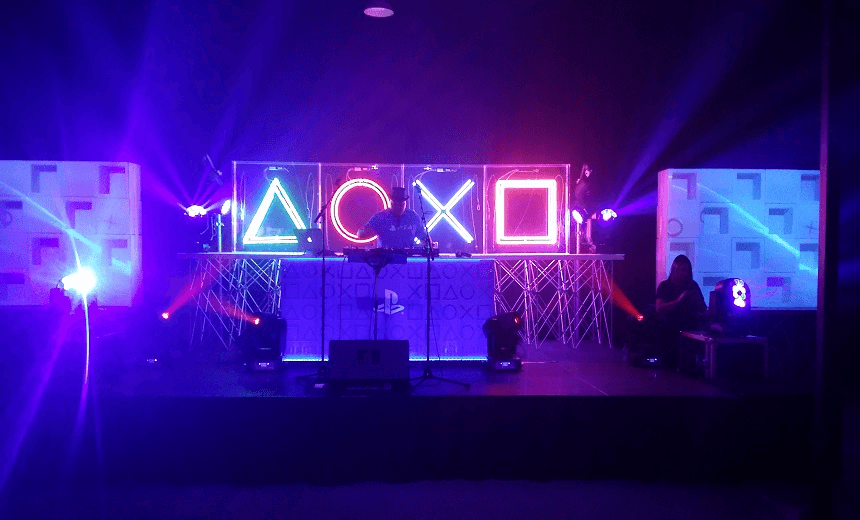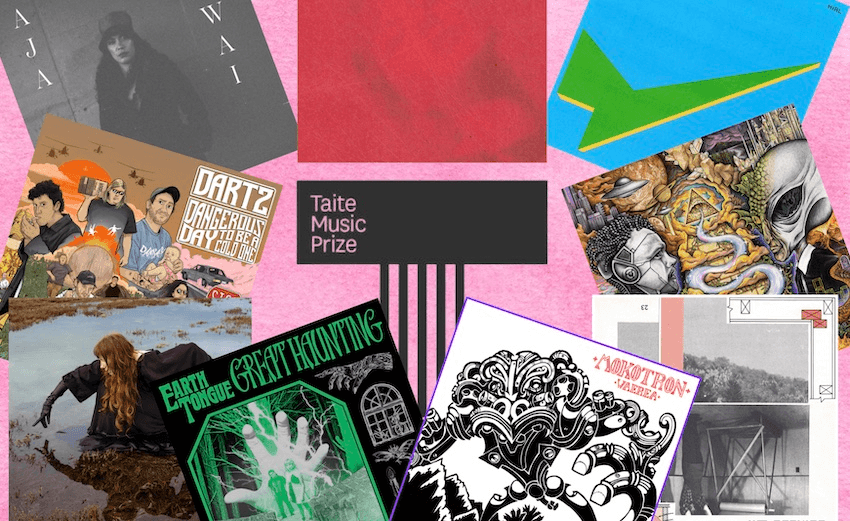To celebrate 20 years of Sony’s PlayStation console, Don Rowe attends a PlayStation party complete with DJ and breakdancers.
I’ve loved PlayStation since I first heard an old, secondhand PS1 come to life. It starts with a heavy synth pad, like the intro to some demonic Kraftwerk song. Then mystical chimes and a techno flute, fading away into the ethereal ‘what if’. The logo itself could have been designed by M. C. Escher – a P and S set at a 90 degree angle, pixelated and rough-edged in the manner of the time.
The sound was thick with possibility. Would I be a professional driver, setting untouchable records on the Nürburgring? Or perhaps an inept skeletal knight, unwittingly reanimated by a dark sorcerer intent on conquering the Kingdom of Gallowmere? Those were about the extent of my options; being unemployed and five years old, my game collection was understandably limited. Glorious were the days when I would borrow a sun-warped copy of Tekken 3, turn the PlayStation upside down, whack it a couple times and hope it would run.
So when I strapped on a VR headset, descended through a school of luminescent jellyfish and watched a monstrous shark tear apart my diving cage at PlayStation’s 20th anniversary event this week, it was a real ‘holy shit’ moment.
The gig went down on Water Street in Grafton. Behind a rolling garage door Sony had constructed a veritable PlayStation nightclub, complete with open bar, dark lighting and a serious sound system. Two stations were allocated for virtual reality – a car chase and the aforementioned shark attack – while elsewhere the faithful played Street Fighter V on an 84’’ flat-screen. Sagat, the giant one-eyed Muay Thai fighter, wasn’t playable, so I stuck to drinking beer and appreciating the TV which was easily bigger than a sliding door.
Che Fu was in attendance. So were Ladyhawke and Dave Fane. There were even a couple of breakdancers, spinning around in front of the official PlayStation DJ who mixed tracks beneath a bold top hat. I’m not sure if they were official PlayStation B-Boys or just guys who felt like throwing down, but their presence was impressive nonetheless.
But I wasn’t only in attendance as some social butterfly, there to bask in free beers and toast 20 years of gaming history in a faux-nightclub. I had an appointment to keep.
Michael Ephraim had a team of just seven Sony staff beneath him when PlayStation 1 launched in Australia. As of 2015 they’ve sold more than 5 million PlayStation consoles in Australasia alone. He’s now Managing Director of Sony Computer Entertainment Australia and New Zealand, as well as Vice President of Sony Computer Entertainment Europe. Serious titles. Accordingly, when we met it was not beneath the blacklight of Club Sony but behind a thick white curtain, cordoned off with a velvet rope.
On the table was a bucket of bottled water on ice, there were olives in tiny bowls, white leather chairs and a lamp. I put my phone between the olives and a beautiful fillet of salmon, golden orange and garnished with cracked pepper. Ephraim ate one olive. I ate nothing. The conversation went as follows.
Describe PlayStation’s position within Sony in 2015.
I think with last quarter’s results PlayStation did very well, our sister companies are doing well as well, but with the ecosystem that we’re building, with the customer accounts we have online, PlayStation is definitely a spearhead. This is not just me saying this, Kaz (Kazuo Hirai), the president of Sony Corp, said that gaming and sensors are a big part of the growth engine of Sony.
Sensors as in VR tech?
Sony is one of the biggest suppliers of cameras for iPhones, so the sensors and chips that are in cameras, but also you have driverless cars too, and there’s all kinds of growth in that area. So definitely PlayStation is a growth engine for Sony.
Can you describe the challenges and triumphs of marketing to a late-adopter culture like New Zealand?
We went through that in the PS1, 2 and 3 cycle, we’ve been very honoured to sell a product that just keeps innovating. When you roll the clock back, PlayStation 1 was the first CD-based technology that also played music CD’s, PlayStation 2 was also used as a cheap DVD player, PlayStation 3 helped win the Blu-Ray battle, and then really started opening up the whole digital, connected, social console. And now, gamification is happening. People are playing games from ages 6 to 66 and older, and the assortment of games we have, whether it’s physical disk or little indie games, digital games, is really starting to appeal to a broad market. And then, the really exciting thing is the non-game content we’re serving up.
There’s obviously a war for attention at the moment. Everywhere you look there’s something trying to grab at you. How does PlayStation move into providing, without abandoning its gaming roots, that experience across multimedia content, apps and that sort of thing?
Consumers are getting bombarded with so much innovation and technology and services and devices. Gaming is at the core of PlayStation, that’s what PlayStation stands for, but as consumers, especially in this part of the world where Netflix just launched in March, there’s a growing awareness and demand also for digital movies and tv and music – we’ve also got Spotify.
How important was securing Spotify?
It’s great to be associated with a brand leader. It has a lot of benefits for the overall offering of PlayStation. For us to be able to say we have gaming, tv, movies and music. Then you look at the connectability and sociability of PlayStation, to have the YouTube app, Twitch and Facebook, where you can post your content, your gameplay onto those online sites with the share button.
Was that particularly important considering the rise of Twitch streaming and users making a living on YouTube playing games?
I take my hat off to the guys who developed PS4 because they realised what people are doing – they’re not just playing singular games, that myth was busted. It’s not a soulless thing to play games. And they realised that people are multitasking, multiscreening, and so having Twitch and YouTube and all that is just what people use when they’re gaming. And PlayStation 4 offers all of that.
PlayStation VR is clearly in advance of even Oculus at this stage. How important has it been driving straight into that market, and where do you see the importance of VR to PlayStation in the next couple of years and into the future?
Listen, it’s early days but, as we said at Paris Games Week, there are over 200 publishers working for PlayStation VR content. I think it just adds another facet to what you can get from PlayStation 4. You can get online gaming, digital downloads, non-game content, and now it’s really the home of gaming. It depends how you want to play games.
Where do you see VR in terms of crossing the bridge between gaming content and the application and video content on PlayStation?
For us, PlayStation VR is about gaming, but when you pull back and look at VR, as we know, it’s going to affect so many different categories. PlayStation VR, as you saw, is a great system – technically it’s excellent – so when you look at how we’ve innovated in the past where we had iToy and Buzz and Singstar, we’ve always innovated through gaming, so I think you can probably expect the same in VR.
How does PlayStation plan to take VR to the next level, where there’s movement and a tactile experience?
At Paris there were several announcements, one from Konami that Tekken will have VR capability, what it is we haven’t seen yet, but Tekken will have VR capability, Gran Turismo will have VR capability. Until Dawn too. We’ve announced a game called Rigs, and what Rigs is, is a futuristic sports game where you jump into a big warrior and there’s something like three or four futuristic stadiums where you’re going in there and fighting it out with other VR users inside of Mech Warriors, so definitely your physical motions will be involved. The shark attack demo, The Deep, was just a demo, and there are many demos out there, but the involvement with the game is the key.
You mentioned the PS2 was a cost-effective DVD player, and people are still using it now. Where do you see the life length of the PS4 compared to its previous iterations?
I don’t know if we ever planned to have it out for a certain period of time, but if you look at PS3 it lasted over 7 or 8 years, and it launched in 2007. Now it’s 2015 and there are a lot of active PS3s and PS4s being sold, so it’s really hard to anticipate at all. When PS3 launched compared to what it can do today, it’s totally a different console, because with 3 and 4 being broadband-enabled, you get firmware updates, so we’re constantly improving on the device now… so how long is a piece of string?
PlayStation 4 recently hit some huge sale numbers. What’s driving the exponential increase in demand? Is it escapism? Is it the quality of the games?
I think the people at Sony, the developers, sort of understood where the gaming audience was – they want high definition gaming, they want connectability, sociability. The fact that these are probably less proprietary than the last consoles, they’re compatible with mobile phone apps, you can use a mobile phone or tablet as a second screen, so it’s embraced all the different ways that people play games, so I think that’s why it’s hitting a chord with people around the world.
It seems to transcend any particular cultural zeitgeist.
Gamification has happened. Different regions have different things that drive gaming. There are titles that are global – FIFA, COD, Star Wars – but then you’ve got games that sell millions of units specifically to the Japanese market. You’ve got the American specific sports market with Madden and basketball games which is permeating down through all Western countries, but you know the whole world has become one community anyway with communications and all that, it’s become a much smaller world, so it’s not unexpected that gaming is enjoyed in so many different cultures and countries.
But the way gaming is enjoyed is changing. Sky TV is going to start screening League of Legends, for example. Does PlayStation intend on moving into these multi-million dollar E-Sport industries?
E-Sports were under the waterline for a long time. It was a PC sort of thing. But Activision just announced its E-Sports tournament next year for CoD – they announced there will be $3 million prize money, and with our association with them it could be on the PlayStation 4 platform. So E-Sports are definitely becoming mainstream, and we will be involved with it. We’ve got no specific announcements, but you know as the consumer demand grows we will be there.
Do you see it as an important market, or is this a flash in the pan?
No. I think five years ago it was very niche. Now it’s not that niche – there are a huge tournaments happening around the world. So if people want to play a certain way, we need to address that market.
Is it possible with the exponential growth of technology and computing power to anticipate where we will be in 10 years?
I’m blown away every year. I’ve been here 20 years and every year we get our annual briefing and they say ‘We’re going to do this’, and I just say ‘Really? Wow.’ So I’ve got some insight into what’s happening, but not that far down the line. If you look at what has happened in ten years, or twenty years, there was no internet twenty years ago, there was no Google, there was no Apple, no nothing. PlayStation was at the start of the big change in technology.
How does it feel working for a company where the possibilities are almost impossible to anticipate?
I feel very lucky and fortunate to be with a company that is constantly innovating, and the challenges that I’m given to manage is out of this world stuff, so very humbled by the opportunities that PlayStation has offered me to be involved in.
This post, like all of our gaming content, is brought to you by the ultrafast broadband legends at Bigpipe. Thanks, Bigpipe. Thankspipe.






